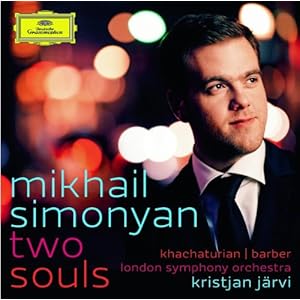Violinist Mikhail Simonyan Releases His Deutsche Grammophon Debut, Two Souls, November 1
 “…a flawless, liquid line and ravishing tone.” – The Washington Post
“…a flawless, liquid line and ravishing tone.” – The Washington Post
Violinist Mikhail Simonyan has covered a lot of ground in a short amount of time. Born in Novosibirsk he traveled to the US when he was 13 to study. Since then he has traveled the world giving concerts and performing concertos with conductors such as Valery Gergiev and Kristjan Järvi and even launched a private initiative, “Beethoven Not Bullets”, to assist the newly founded Afghanistan National Institute of Music in Kabul. For his Deutsche Grammophon and concerto recording debut he has chosen the concertos of Khachaturian and Barber to reflect the two dominant aspects of his life. He is joined by conductor Kristjan Järvi and the London Symphony Orchestra. The album will be released on November 1, 2011 in the US.
Mikhail Simonyan is of Armenian and Russian heritage and began playing the violin at the age of 5. (Interestingly, violinists Vadim Repin and Maxim Vengerov are both natives of Novosibirsk.) When he was 13, he toured the US as soloist with the American Russian Young Artists Orchestra; soon afterwards he moved to America and entered the Curtis Institute in Philadelphia to study with Victor Danchenko, a pupil of David Oistrakh. “Prokofiev, Shostakovich, Khachaturian – Victor Danchenko had known them all and studied their music with Oistrakh, who gave the premiere of many of their works, including the Khachaturian Concerto”, says Simonyan. “It was wonderful to learn from him the traditions of performing that music.”
For this recording, Simonyan has commissioned a new cadenza for the Khachaturian concerto since he found the original essentially Oistrakh’s version, which is violinistic and virtuosic but lacking in an essentially Armenian quality. “This new cadenza,” according to Simonyan, “has a strong feeling of Armenian church music. Armenia was the first Christian country and has been persecuted for religion all through its history. Part of what it means to be an Armenian today is rooted in our deep, ancient and unique church music tradition. This element in Avanesov’s cadenza brings a whole new color to the concerto.”

Comments